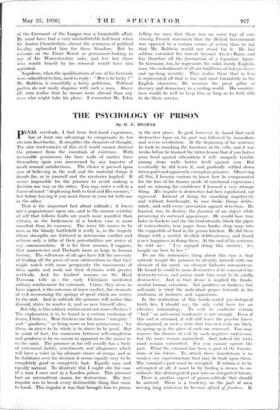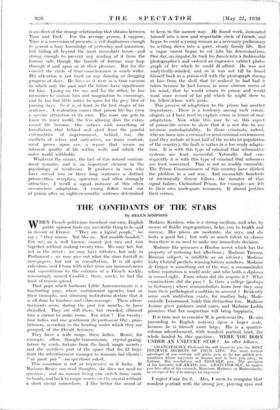THE PSYCHOLOGY OF PRISON
By H. E. DEGRAS
PENAL servitude, I find from first-hand experience, has at least one advantage to compensate its too obvious drawbacks. It simplifies the elements of thought.
The nice irrelevancies of this civil world cannot distract the prisoner from the essentials of existence. With inexorable persistence the bare walls of matter force themselves upon you unscreened by any tapestry of small sensual satisfactions. The choice is pressed upon you of believing in the wall and the material things it stands for, or in yourself and the mysteries implied. It seems impossible for the prisoner to avoid making a decision one way or the other. You may enter a cell in a fraine of Mind " displeasing both to God and His enemies," but before leaving it you must throw in your.lot with one or the other.
That is the important fact about solitude ; it forces one's acquaintance upon one, and in the narrow scrutiny of self that follows faults are much more manifest than virtues, as the brokenness of a broken vase is more manifest than its vaseness. The inner life comes to be seen as the bloody battlefield it really is, as the tragedy where strengths are frittered in internecine conflict and achieve only a tithe of their potentialities nor arrive at any consummation. It is for these reasons, I suppose, Unit monasteries and Thebaids loom so large in human history. The self-aware of all ages have felt the necessity of fending off the press of near obstructions so that they might watch with more perspicuity, the movements of their spirits and work out their destinies with greater Certitude. And for kindred reasons—so Sir Basil Thomson tells us — the early Christians instituted solitary confinement for criminals. Crime, they seem to have argued, is the outcome of inner conflict, the elements of evil overcoming the springs of good which arc native to .the soul. And in solitude the prisoner will realise this discord, 'strive to resolve it, and so save himself alive.
But why is this solitary confinement not more effective ? The explanation is to be found in a certain confusion of terms, I believe. Most thinkers Ilse the terms " integrity " and " goodness " as being more or less synOnymous ; for them, to strive to be whole is to strive to be good. But in point of fact, the connexion between self-coinpletion and goodness is by no means as apparent to the sinner as to the saint. The prisoner in his cell usually has a body of anti-social habits, resentments and allegiances which will have a Voice in his ultimate choice of camps, and as he dubitates over his decision it seems equally easy to be completely good or completely bad. Equally easy and equally natural. To illustrate this I might cite the case of a man I once met in a London prison. This prisoner had an intermittent mania for destruction. His first impulse was to break every destructible thing that came to hand. This impulse it was that brought him to prison in the first plaCe. In gaol, however, he found that each destructive lapse on his part was followed by immediate and severe retribution. At the beginning of his sentence he took to smashing the furniture of the cells, and it was weeks before he learned the bitter lesson that if you batter your head against officialdom it will—uniquely terrible among stone walls—batter itself against you. But eventually he did learn it, and gradually settled down into a quiet and apparently exemplary prisoner. Obsery ing all this, I became curious to know how he compensated for the loss of his former mode of emotional expression ; and on winning his confidence I learned a very strange thing. His impulse to destruction had been regularised, not repressed. Instead of doing his smashing impulsively and without forethought, he now broke things delibe- rately, and With every precaution against detection. Ile learned, too, to destroy the function of an object while preserving its outward appearance. He would bore tiny holes in buckets and the tin food-utensils, block the pipes of water-closets, tear pages from books, drop soap into the copperfuls of food in the prison kitchen. He did these things with a zestful, devilish deliberateness, and found a new happiness in doing them. At the end of his sentence he told me : " I've enjoyed doing this stretch ; it's taught me how to live I " To me the instructive thing about this case is that solitude taught the prisoner to identify himself with one element of his mind—an element hitherto intermittent.
He found he could be more destructive if he concealed his destructiveness, and prison made him want to be wholly destructive. And in that desire is implied the funda- mental human valuation. Not goodness or badness, but self-unity is what the individual gropes towards in his confusion of instincts and aspirations.
In the realisation of this fundir mental psychological truth lies, I should say, the only valid basis for an effective criminology. To seek to eradicate certain " bad " or anti-social tendencies is not enough. Even if this end is attained, it will still leave the psychic forces disorganised, in such a state that two new evils are likely to spring up in the place of each one removed. You may remove the flowers of evil by such negative endeavour, but the roots remain untouched. And indeed the roots must remain untouched. For you cannot uproot the past. What the criminal has been is part of the founda- tions of his future. To attack those foundations is to weaken any superstructure that may be built upon them. The criminal's past must be accepted. If reform is to be 'attempted at all, it must be by finding a means to co- ordinate this disintegrated past into an integrated future.
There is another aspect of prison-solitude that should be noticed. There is a tendency on the part of men serving long sentences to become afraid of freedom. It is an effect of the strange relationship that obtains between Time and Tied. For the average person, I suppose, Time is a succession of presents, a veil diaphanous enough to permit a hazy knowledge of yesterday and tomorrow, but hiding all beyond the most immediate hours—and strong enough to prevent any rending of it from the human side, though the hounds of fortune may leap through it and upon us at their pleasure. But for the convict the circle of time-consciousness is much wider. His attention is not fixed on any dancing or dragging progress of days. He lives as it were in a time-vacuum in which only the past and the future have significance for him. Living on the one and for the other, he has memories to sustain him and imagination to encourage, and he has but little notice to spare for the grey blur of passing days. So it is, at least, in the first stages of his sentence. A realisation comes that prison life has even a specific attraction of its own. The more one gets to know its inner world, the less alluring does the extra- mural life become. One notices with something of humiliation that behind and aloof from the painful externalities of imprisonment, behind, too, the conflicts of selves and anti-selves, an inner content- ment grows upon one, a repose that seems an inherent quality of life within walls and which the outer world withholds.
Whatever the causes, the fact of this inward content- ment remains, and is an important clement in the psychology of recidivism. It produces in men who have served two or three long sentences a distinct prison-ethos, acceptive, quiescent, and often strangely attractive. I recall a signal instance of this often unconscious adaptation. A young • fellow went out of prison after an eighteen-months' sentence determined to keep to the narrow way. He found work, insinuated himself into- a new and respectable circle of friends, and began to court a young woman as a necessary preliminary to settling down into a quiet, steady family life. But a vague unrest began to eat into his determinations. One day, on impulse, he took his fiancée into a fashionable photographer's and ordered an expensive cabinet photo- graph of her which he could ill afford. He was not analytically-minded, and so it was not till he found himself back in a prison-cell with the photograph. staring at him from the shelf that he realised he had had it taken because he had known, in some obscure- recess of his mind, that he would return to prison and would want some record of his girl which he might show to his fellow-felons with pride.
This process of adaptation to the prison has another importance. There is a tendency among such crimin- ologists as I have read to explain crime in terms of mal- adaptation. Now while this may be so, this .aspect of prison-life seems to show that it is not due to any intrinsic maladaptability. In those criminals, indeed, who are born into a criminal or semi-criminal environment (and they include at least half of the recidivist population of the country), the fault is rather in a too ready adapta- tion. It is with this type of criminal that reformative systems are least successful. Naturally. And con- sequently it is with this type of criminal that reformers arc least concerned. That is not so readily excusable. The Prison Commissioners of this country have shirked the problem in a sad way. And meanwhile hundreds of intrinsically decent fellows—the inmates of that signal failure, Chelmsford Prison, for example—are left to their own inadequate resources. It almost justifies their crimes.



















































 Previous page
Previous page